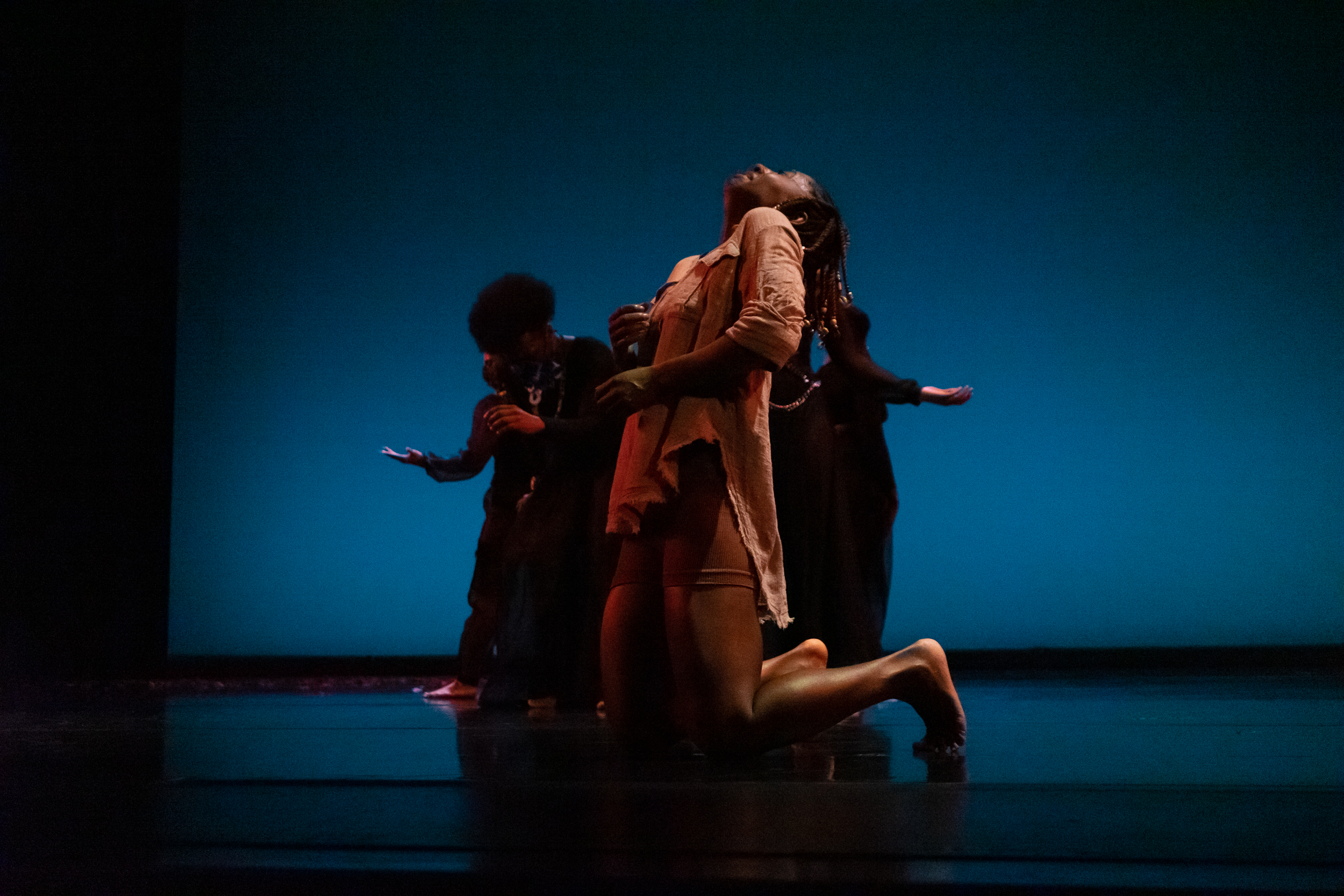by Free Black Dirt’s Junauda Petrus-Nasah and Erin Sharkey
An offering at The Great Northern Festival asks us to consider what the Orisha has to say to us in the turbulent moments we are in as we begin 2022. Presented with The Great Northern, The Cowles Center and Northrop, dancer and choreographer Alanna Morris invites audiences to a follow-up to 2018’s Yam, Potato an Fish!.
Rituals in White
In the opening scene, we as the witnesses and attendants to this piece are brought into a centering moment that is tangible and primordial. We see Florencia Pierre and Djenane St. Juste, two Black women of different generations holding vessels extended from their bodies. Out of the ceramic cascades the beads and braids of Black girlhood onto hands and around the necks of the vases. In this sequence, the audience is invited to ponder, what are the vessels of self and womanhood that come from our past generations? In what ways are the women who we come from reflected in us and our unfolding lives?
The next section we are invited to experience is part ritual, part storytelling, part tone-setting. A convening of beautiful Black people adorned in all white, the crowns and headwraps are styled with matching white masks, to locate us in this time of pandemic. The white is a cleansing, sun-bleached shell, crisp linen, and fresh snow. The white reflects off the black skin and accents its darkness. The white is mourning and sea foam, cloud and Obatala. The ritual in this moment of the piece takes time with us and itself.
“In the beginning, the word was she,” says performer Paige Reynolds, as they read stories of reimagined origins from a leather-bound book. This opening reminds us that African dance was ancestrally never separated from ritual or story, but was the center of it. These movements understand that aesthetics and adornment are sacred parts of existence. The tone set here is that ritual, dance, and libations are all unified again in this piece and are a reflection of how our ancestors held spirit and magic together in both hands.
The words of local writer, Louis Alemanyeu, fill the space, “those who are dead are not yet dead.” He cautions us to listen more to nature – to the speaking woods, sleeping waters. “Ancestors aren’t really dead”. Louis offers a space for the ineffable presence of our ancestors known and unknown, “the waters that flow and the waters that sleep,” he provides us with the promise of being surrounded and held in a familial bond beyond the veil.

Oya’s Dance
There is a summoning; Ọya comes violent, in wind and storm, in tumble elements. Afro-Cuban ancestral serenades hover amid a constellation of stars that illuminate the stage. Alanna slowly rocks back and forth as if preparing to pounce. This movement honors the fierce warrior of Oya, the Orisha of cemeteries, rainbows, machetes, and doorways to the realm of ancestors.
Snake-like movements in incense smoke and each round she returns to connect the gaze. Alanna as Oya is in communion with other warrior dancers at the edges and remains steady through it all.
Oya is as much a warrior as she is a lover and powerful in her sensual appetites. In Alanna’s evocation of the deity, she stands firm and swaying in a bathing of red. Red background, red dress, dim lighting, and flickering candles are the realm where we see Oya holding space and vigilance for anything that might need attention. In contemplating the reflections of Oya in this piece and our current world, I am reminded of the countless warrior femmes of our modern-day Black movements that have sprung through and beyond BLM and other Black resistance lineages, both warriors and attendants to the ancestors created by police violence.
Orange moon
The music shifts from call and response and the djembe to the soulful scratchy croon of Erykah Badu, I’m an orange moon, burning brighter than before. Alanna brings us into a more intimate moment. In front of a full-length mirror, showering in flower petals, the dancer seduces herself. How good it is…how good it is.
In this section, Oshun is arriving to center on the essential response to battle or perhaps what the Black femme warriors of our day are reminding us, that pleasure is what we deserve and why we battle. That we are in duality with war and pleasure, that pleasure is as much a part of our ancestral entitlement as is the struggle. We are reminded here of the importance of Black spirits and form being in relationship with divinity and sensuality especially in an epoch of us being associated with the violence and erasure of our existence. Dancers Demetrius McClendon, Yoni Light, Gabrielle Abram, and Andrea Potter provide ancestral shadow and whirlwind to these reimaginings of divinity, sensuality, and healing. They move in mirrored rhythm but distinctly and of their own essence.

If freedom and liberation are already what I am
Dancers encircle an empty throne as Jamaican teacher Mooji responds to an inquiry about attachment that begs consideration. Mooji rephrases the question and in rephrasing it, answers the question with more clarity, and then disassembles the question again, to reassemble it for an understanding that is one that must be felt and not known. Alanna embodies the questioning and the questioning of the questioning with renewed visceral curiosity to try and feel and not simply know. These feelings versus knowings are an unconscious compass within Blackness and Buddhism. “The mind has no answers, the heart no questions” is witnessed in the body and in the nature of Black wayfinding that is a part of our survival, our yearning, and heart song.

Carnival as Ancestral Pleasure Activism
The stage is flooded with bright orange sunshine and Alanna is in carnival mode. Carnival like many collective celebrations is ensconced in resistance and ancestral pleasure activism. The glee of these celebrations is an inherent juxtaposition to the terror and repression that define the rest of the year. Trinidad’s Carnival origin story, much like the carnival celebrated in Brazil and the Mardi gras of New Orleans, was a concession of festivity that was offered by enslavers as a sliver of freedom, whimsy, and play that would supposedly satiate their repressed humanity. But freedom and Blackness are insatiable, and these festivals remind us of that in their yearly observance.
Black Light meets at the intersections of creation and death, things made and unmade, at the meeting of what the choreographer describes as noble blackness and the divine feminine. In this closing dance, Alanna honors herself and her freedom, winding and shaking in the scattered petals of self-love and knowing amid her feet.
Junauda Petrus-Nasah is a writer, pleasure activist, filmmaker and performance artist of Black-Caribbean descent, born on Dakota land. Her work centers around wildness, queerness, Black-diasporic-futurism, ancestral healing, sweetness, shimmer and liberation. She is the co-founder with Erin Sharkey of Free Black Dirt, an experimental arts production company. She is the writer and director of “Sweetness of Wild” a poetic-episodic film series themed around Blackness, queerness, biking, resistance, love and coming of age in Minneapolis. Her first YA novel, The Stars and The Blackness Between Them is out on Dutton Children’s. She lives in Minneapolis with her wife, child, and family.
Erin Sharkey is a writer and cultural producer based in Minneapolis. She is the co-founder, with Junauda Petrus, of an experimental arts production company called Free Black Dirt. Erin was a Bell Museum Artist-in-Residence, Loft Mentor Series mentee, VONA fellow, Jerome Travel and Study grantee, and Givens Foundation fellow. Her work as appeared in Brooklyn Quarterly, Paper Darts and Walker Sightlines and Primer Magazines and is editing a forthcoming publication on Milkweed Editions. In 2019, She was awarded the Minnesota State Arts Board Artist Initiative grant, and is currently producing, Sweetness of Wild, an episodic web film project, and teaching with Minnesota Prison Writers Workshop and Metro State University. Erin worked as the MayDay Parade and Ceremony Production Manager in 2016 and 2017 and was a consultant to the Parade Celebration in 2018.

Free Black Dirt is an artistic partnership formed by Minneapolis-based collaborators Junauda Petrus and Erin Sharkey. Committed to creating original theatre and performance, hosting innovative events, organizing local artists, and promoting and supporting the emerging artists’ community in the Twin Cities, Free Black Dirt seeks to spark and engage in critical conversations.

